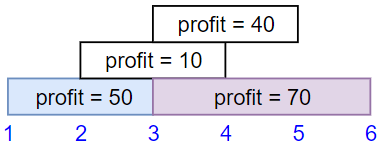1235. Maximum Profit in Job Scheduling #
题目 #
We have n jobs, where every job is scheduled to be done from startTime[i] to endTime[i], obtaining a profit of profit[i].
You’re given the startTime , endTime and profit arrays, you need to output the maximum profit you can take such that there are no 2 jobs in the subset with overlapping time range.
If you choose a job that ends at time X you will be able to start another job that starts at time X.
Example 1:

Input: startTime = [1,2,3,3], endTime = [3,4,5,6], profit = [50,10,40,70]
Output: 120
Explanation: The subset chosen is the first and fourth job.
Time range [1-3]+[3-6] , we get profit of 120 = 50 + 70.
Example 2:

Input: startTime = [1,2,3,4,6], endTime = [3,5,10,6,9], profit = [20,20,100,70,60]
Output: 150
Explanation: The subset chosen is the first, fourth and fifth job.
Profit obtained 150 = 20 + 70 + 60.
Example 3:

Input: startTime = [1,1,1], endTime = [2,3,4], profit = [5,6,4]
Output: 6
Constraints:
1 <= startTime.length == endTime.length == profit.length <= 5 * 10^41 <= startTime[i] < endTime[i] <= 10^91 <= profit[i] <= 10^4
题目大意 #
你打算利用空闲时间来做兼职工作赚些零花钱。这里有 n 份兼职工作,每份工作预计从 startTime[i] 开始到 endTime[i] 结束,报酬为 profit[i]。给你一份兼职工作表,包含开始时间 startTime,结束时间 endTime 和预计报酬 profit 三个数组,请你计算并返回可以获得的最大报酬。注意,时间上出现重叠的 2 份工作不能同时进行。如果你选择的工作在时间 X 结束,那么你可以立刻进行在时间 X 开始的下一份工作。
提示:
- 1 <= startTime.length == endTime.length == profit.length <= 5 * 10^4
- 1 <= startTime[i] < endTime[i] <= 10^9
- 1 <= profit[i] <= 10^4
解题思路 #
- 给出一组任务,任务有开始时间,结束时间,和任务收益。一个任务开始还没有结束,中间就不能再安排其他任务。问如何安排任务,能使得最后收益最大?
- 一般任务的题目,区间的题目,都会考虑是否能排序。这一题可以先按照任务的结束时间从小到大排序,如果结束时间相同,则按照收益从小到大排序。
dp[i]代表前i份工作能获得的最大收益。初始值,dp[0] = job[1].profit。对于任意一个任务i,看能否找到满足jobs[j].enTime <= jobs[j].startTime && j < i条件的j,即查找upper_bound。由于jobs被我们排序了,所以这里可以使用二分搜索来查找。如果能找到满足条件的任务 j,那么状态转移方程是:dp[i] = max(dp[i-1], jobs[i].profit)。如果能找到满足条件的任务 j,那么状态转移方程是:dp[i] = max(dp[i-1], dp[low]+jobs[i].profit)。最终求得的解在dp[len(startTime)-1]中。
代码 #
package leetcode
import "sort"
type job struct {
startTime int
endTime int
profit int
}
func jobScheduling(startTime []int, endTime []int, profit []int) int {
jobs, dp := []job{}, make([]int, len(startTime))
for i := 0; i < len(startTime); i++ {
jobs = append(jobs, job{startTime: startTime[i], endTime: endTime[i], profit: profit[i]})
}
sort.Sort(sortJobs(jobs))
dp[0] = jobs[0].profit
for i := 1; i < len(jobs); i++ {
low, high := 0, i-1
for low < high {
mid := low + (high-low)>>1
if jobs[mid+1].endTime <= jobs[i].startTime {
low = mid + 1
} else {
high = mid
}
}
if jobs[low].endTime <= jobs[i].startTime {
dp[i] = max(dp[i-1], dp[low]+jobs[i].profit)
} else {
dp[i] = max(dp[i-1], jobs[i].profit)
}
}
return dp[len(startTime)-1]
}
type sortJobs []job
func (s sortJobs) Len() int {
return len(s)
}
func (s sortJobs) Less(i, j int) bool {
if s[i].endTime == s[j].endTime {
return s[i].profit < s[j].profit
}
return s[i].endTime < s[j].endTime
}
func (s sortJobs) Swap(i, j int) {
s[i], s[j] = s[j], s[i]
}